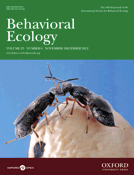
BEHAVIORAL ECOLOGY
Scope & Guideline
Advancing Knowledge at the Intersection of Ecology and Animal Science
Introduction
Aims and Scopes
- Behavioral Ecology and Evolution:
The journal primarily addresses how ecological conditions influence behavior and the evolutionary implications of these behaviors, including aspects such as foraging, mating strategies, and parental investment. - Interdisciplinary Research:
It encourages research that integrates behavioral ecology with other fields like genetics, physiology, and social sciences, fostering a holistic understanding of animal behavior. - Adaptation and Flexibility:
A key focus is on adaptive behaviors and plasticity, examining how animals adjust their behaviors in response to environmental changes, social dynamics, and resource availability. - Social Behavior and Dynamics:
The journal covers topics related to social interactions, dominance hierarchies, and group dynamics, providing insights into how these influence individual fitness and population structure. - Anthropogenic Effects:
There is a growing emphasis on how human-induced changes, such as urbanization and climate change, affect animal behavior and ecology, highlighting the relevance of behavioral ecology in contemporary conservation issues.
Trending and Emerging
- Impact of Climate Change:
Research examining how climate change affects animal behavior, including foraging, migration, and reproductive strategies, is gaining traction as ecological pressures intensify. - Cognition and Learning in Natural Contexts:
There is an increasing focus on cognitive flexibility and learning strategies in animals as researchers explore how these traits enhance survival and reproductive success in changing environments. - Social Networks and Dynamics:
Emerging studies are investigating the role of social networks in shaping behavior, emphasizing how social structures influence individual fitness and group dynamics. - Anthropogenic Influences on Behavior:
The journal is seeing a rise in studies that assess the impacts of urbanization, pollution, and habitat destruction on animal behavior, highlighting the relevance of behavioral ecology in conservation. - Behavioral Responses to Environmental Variability:
Research exploring how animals adapt their behaviors in response to environmental variability, such as resource availability and predation risk, is increasingly prominent.
Declining or Waning
- Traditional Behavioral Studies:
There seems to be a waning interest in purely observational studies of animal behavior without ecological context, as the journal increasingly favors studies that combine behavior with ecological and evolutionary frameworks. - Limited Focus on Laboratory Studies:
Research that primarily relies on controlled laboratory settings is becoming less prevalent, with a shift towards field studies that emphasize naturalistic conditions and ecological relevance. - Narrowed Scope of Sexual Selection Studies:
While sexual selection remains a topic of interest, there is a noticeable decline in studies that focus solely on sexual selection mechanisms without considering broader ecological interactions. - Reduction of Generalist Behavior Studies:
Research focusing on generalist behaviors in isolation is declining, with more emphasis being placed on specific adaptive behaviors in particular ecological contexts. - Less Emphasis on Historical Ecology:
Historical perspectives in behavioral ecology are receiving less attention, as contemporary studies increasingly prioritize current ecological dynamics and immediate behavioral adaptations.
Similar Journals

RUSSIAN JOURNAL OF THERIOLOGY
Fostering Insights into Evolution and BehaviorRUSSIAN JOURNAL OF THERIOLOGY is a prominent academic journal published by KMK SCIENTIFIC PRESS LTD in collaboration with the esteemed Moscow State University. As a dedicated platform for researchers in the fields of Animal Science and Zoology, Ecology, Evolution, Behavior and Systematics, and Plant Science, this journal strives to advance our understanding of terrestrial ecosystems and their inhabitants. Although it currently holds a Q4 ranking and ranks within the lower percentiles of its respective categories, the journal's consistent publishing output since 2011 showcases a commitment to facilitating scientific discourse and collaboration. Addressed to a diverse audience of researchers, professionals, and students, RUSSIAN JOURNAL OF THERIOLOGY serves as an essential resource for disseminating valuable insights and fostering future advancements in the biological sciences.
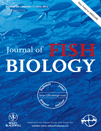
JOURNAL OF FISH BIOLOGY
Pioneering Research in Fish Biology and EcologyJOURNAL OF FISH BIOLOGY, published by Wiley in the United Kingdom, is a distinguished peer-reviewed journal dedicated to advancing the understanding of the biology and relationships of fishes. With a robust history from its inception in 1969 to its future publications extending into 2024, the journal occupies a pivotal position in the academic landscape of aquatic sciences and ecology. Holding a notable Impact Factor and recognized within the second quartile (Q2) for both Aquatic Science and Ecology, Evolution, Behavior and Systematics, it serves as an essential resource for researchers, professionals, and students alike. The journal’s contributors delve into diverse topics ranging from evolutionary biology to conservation strategies, fostering a dynamic interchange of knowledge and innovation within the fish biology community. Access options are currently via subscription, ensuring high-quality, curated content that reflects the latest empirical research and theoretical advancements in the field.
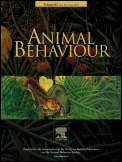
ANIMAL BEHAVIOUR
Decoding the Language of Animal Behavior.ANIMAL BEHAVIOUR is a leading peer-reviewed journal published by Academic Press Ltd - Elsevier Science Ltd, dedicated to advancing the understanding of animal behavior across various disciplines including Animal Science, Zoology, and Ecology. Established in 1958, this esteemed journal has maintained a prestigious status, as reflected in its Q1 quartile rankings in both its primary categories as of 2023. With a strong Scopus rank in the 84th percentile for Animal Science and Zoology, and 75th percentile for Ecology, Evolution, Behavior and Systematics, ANIMAL BEHAVIOUR serves as an essential platform for researchers, professionals, and students to disseminate innovative findings and theoretical advancements. The journal encompasses a broad scope, welcoming studies that illuminate the biological, ecological, and evolutionary underpinnings of animal behavior. With its commitment to fostering cutting-edge research, it plays a critical role in addressing fundamental questions and challenges in the field, ensuring that it remains pivotal for the academic community dedicated to understanding the complexities of animal life.

BEHAVIORAL ECOLOGY AND SOCIOBIOLOGY
Connecting Behavior and Environment for Deeper UnderstandingBehavioral Ecology and Sociobiology is a peer-reviewed journal published by Springer, focusing on the nuanced interactions between animal behavior and ecological factors. With an impressive history dating back to 1976, the journal has made significant contributions to the field, maintaining a prominent position in the top quartile (Q1) for both Animal Science and Zoology, as well as Ecology, Evolution, Behavior, and Systematics, as of 2023. Its high Scopus rank underscores its influence, being recognized in the 79th percentile for Animal Science and the 68th percentile for Ecology. This journal serves as an essential platform for researchers, professionals, and students interested in exploring the evolutionary implications of social structures and behavioral traits in various species. Although it does not currently operate under an open-access model, its rigorous peer-review process ensures that published studies meet high academic standards. With a vast array of innovative articles spanning decades, Behavioral Ecology and Sociobiology remains a vital resource for advancing our understanding of the complex interplay between behavior and ecological dynamics.
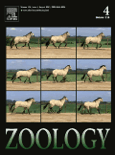
ZOOLOGY
Connecting scholars to elevate zoological research.ZOOLOGY, an esteemed journal published by Elsevier GmbH, stands at the forefront of research in the Animal Science and Zoology fields. With a notable impact factor and recognized as a Q1 category journal in its discipline, ZOOLOGY is highly regarded among researchers, ranking #98 out of 490 in Scopus rankings. Founded in 1994 and continuing through to 2024, the journal aims to publish cutting-edge, peer-reviewed articles that contribute significantly to the understanding of zoological sciences. Based in Munich, Germany, ZOOLOGY provides both subscription and open access options, ensuring that influential research reaches a wider audience. It serves as an essential platform for disseminating innovative findings, connecting scholars globally, and fostering interdisciplinary collaboration to advance zoological knowledge.
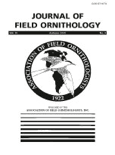
JOURNAL OF FIELD ORNITHOLOGY
Illuminating the Interactions of Birds and EcosystemsJOURNAL OF FIELD ORNITHOLOGY, published by the Resilience Alliance, is a premier academic journal dedicated to advancing knowledge in the fields of ornithology, ecology, and animal behavior. With an ISSN of 0273-8570 and a growing E-ISSN of 1557-9263, this journal has been a vital platform for researchers since its inception in 1996, continuing to publish cutting-edge studies up until 2024. The journal is recognized within the academic community, holding a Q2 ranking in Animal Science and Zoology and a Q3 ranking in Ecology, Evolution, Behavior and Systematics as of 2023. While the journal does not currently operate under an open access model, it remains a critical source for researchers, students, and professionals seeking to explore innovative research and discoveries in field ornithology. The diverse range of topics covered underscores its commitment to highlighting significant findings and fostering a deeper understanding of avian species and their ecosystems.
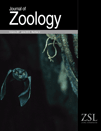
JOURNAL OF ZOOLOGY
Uncovering groundbreaking discoveries in animal science.JOURNAL OF ZOOLOGY, published by Wiley, stands as a premier scholarly journal in the fields of Animal Science and Zoology, renowned for its outstanding contributions to the knowledge of animal biology and ecology. With an impressive impact factor and a strong ranking in the Q1 category for Animal Science and Zoology, as well as Q2 for Ecology, Evolution, Behavior, and Systematics, the journal rigorously engages with both foundational research and groundbreaking discoveries since its inception in 1830. Located in Hoboken, New Jersey, this journal is dedicated to fostering the academic community's understanding of zoological sciences, providing access to important research that shapes wildlife conservation efforts and ecological studies. Although the journal does not currently offer open access options, it continues to attract significant attention, as evidenced by its strong Scopus rankings in related categories. Researchers, professionals, and students will find invaluable resources in the JOURNAL OF ZOOLOGY to advance their understanding of animal life and the ecological challenges it faces today.

Frontiers in Zoology
Innovating the study of ecology and evolution.Frontiers in Zoology is a premier, open-access journal published by BMC that has been a cornerstone of zoological research since its inception in 2004. With a commitment to advancing the field, this journal covers a broad spectrum of topics within Animal Science and Zoology, as well as Ecology, Evolution, Behavior, and Systematics. Recognized for its quality, it holds a distinguished Q1 ranking in both of these categories and ranks within the top percentiles in Scopus, with 87th and 78th percentiles, respectively. Based in the United Kingdom, it provides researchers, professionals, and students with innovative studies and findings that encourage interdisciplinary collaboration and exploration. The journal is dedicated to facilitating the open exchange of scientific knowledge, making it an essential resource for those seeking to stay at the forefront of zoological and ecological sciences.

JOURNAL OF AVIAN BIOLOGY
Fostering interdisciplinary dialogue in avian research.Journal of Avian Biology, published by Wiley, is a leading journal in the field of animal science and zoology, with an impressive impact factor highlighting its significance in advancing our understanding of avian ecology and behavior. Since its inception in 1994, this journal has provided a vital platform for researchers, professionals, and students to share innovative studies and findings related to avian biology, contributing to a broader understanding of ecological dynamics and conservation strategies. Recognized in the Q1 category for Animal Science and Zoology and Q2 for Ecology, Evolution, Behavior and Systematics, it ranks 112th out of 490 in its primary field, demonstrating a strong percentile performance. The journal invites submissions that explore diverse aspects of avian research, fostering interdisciplinary discussions that are crucial for ongoing scientific inquiries. With both print and electronic formats, it maintains an accessible repository of knowledge for the global conservation community. Engage with the latest in avian studies through the Journal of Avian Biology and contribute to the evolution of this critical field.

ORNITHOLOGICAL SCIENCE
Advancing avian knowledge for a sustainable future.ORNITHOLOGICAL SCIENCE, published by the Ornithological Society of Japan in collaboration with the University of Tokyo, stands as a pivotal platform for advancing knowledge in the field of ornithology. With a keen focus on avian biology and conservation, this esteemed journal is dedicated to publishing high-quality research, reviews, and technical notes that explore the intricacies of bird science. Although currently categorized within the Q4 quartile in Animal Science and Zoology, the journal aims to elevate its standings by fostering scholarly communication and impactful scientific discourse. This journal has been consistently publishing since its inception in 2002, with a brief hiatus before resuming its invaluable contributions to the scientific community in 2009. Despite the absence of specific open access options, the journal remains a crucial resource for researchers, professionals, and students seeking to expand their understanding of avian ecology and behavior. Through its comprehensive scope, ORNITHOLOGICAL SCIENCE reflects the increasing importance of ornithological studies in addressing global biodiversity issues and conservation challenges.